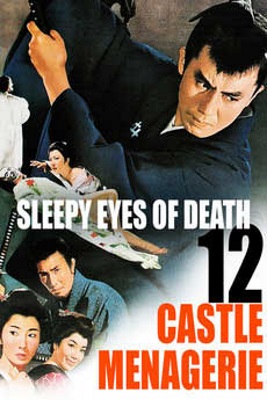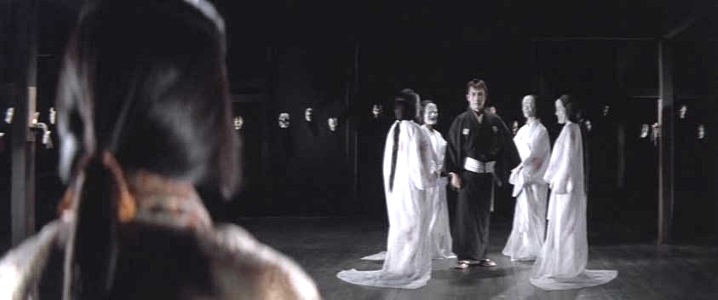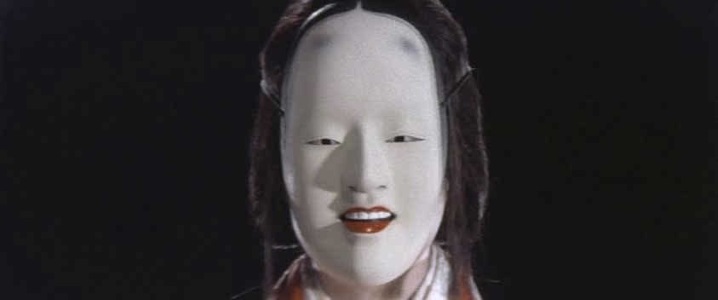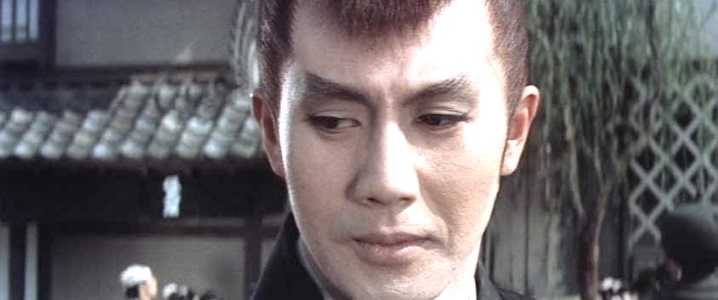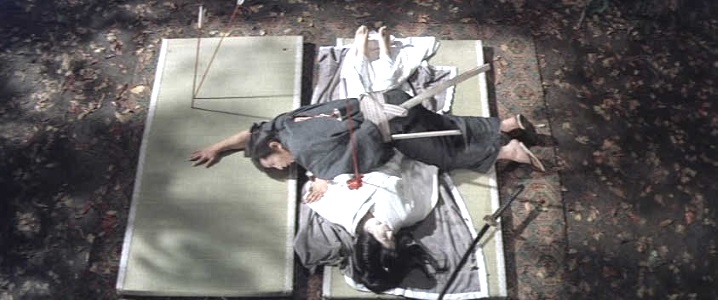In this the 12th and final
film in the series with Raizô Ichikawa as the protagonist, Nemuri Kyoshiro
is as indestructible as ever, killing all those who come after him. Sadly,
this was not true of the actor who had portrayed him since 1963 and made
the character and the actor iconic. Ichikawa was dying. He had health issues
for the entire decade and digestive problems and now rectal cancer. He was
to pass away in this same year at the age of 37 years-old after surgery.
His life would have made an interesting film. Born in 1931, his father soon
went off to a military assignment leaving his wife behind at the mercy of
his family who treated her poorly. She left them and went off to live with
her newly born son. At six months old, she was persuaded to give up her son
to her husband's brother-in-law for adoption. Raizô never learned that
he had been adopted till he was sixteen and never saw his mother again till
he was 30.
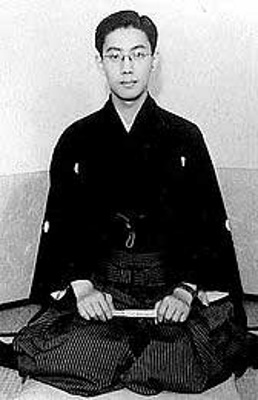
He became interested in Kabuki and trained as an actor, first performing
when he was fifteen. But Kabuki was a closed community of actors who came
from Kabuki families. That was not the case with Raizô and so he was
only given small roles But an interest in him was taken by the President
of the Kansai Kabuki Actors Guild and in 1951 Raizô was again adopted
and his career in Kabuki is allowed to take another step forward. This feels
very foreign to Westerners but if you watch a lot of Japanese films this
custom of adoption of people already with parents is or perhaps was common.
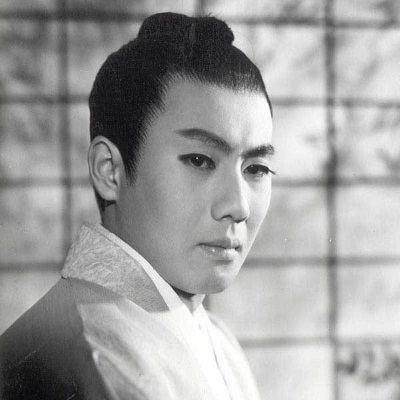
Even with that though Raizô wasn't satisfied with his Kabuki career
and in 1954 he signed up with Daiei and was to be with them for his entire
career. He was not an overnight sensation though and it took him until his
role in Kon Ichikawa's Enjo in 1958 to make him a star. He was in tons of
films over those years- often making ten in a year - and this series solidified
his stardom. When I saw the first in the series with his cold anti-hero cynical
selfish character, I wondered whether they would have to soften him up in
the next films for the audience to take to him. Yes and no. Mainly no. He
does his best to stay uninvolved and detached but when he is unable to stay
that way, it is always on the side of good against evil.
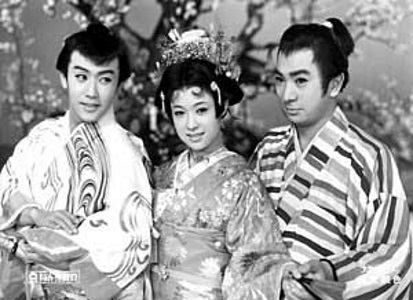
In a few of the films he cold-bloodily kills a few defenseless women - something
that you will rarely see from the hero in any film. But they brought it on
themselves. He is a wanderer as is his fellow Daiei actor and friend, Shintarō
Katsu, in the Zatoichi films. In that sense they are similar, but the blind
masseur always came to the help of the dispossessed, the damsel in distress
and the oppressed while Nemuri often ended up at the same point but not willingly.
If Nemuri had met up with Zatoichi as Zatoichi did with the One-Armed Swordsman,
it would have been interesting.
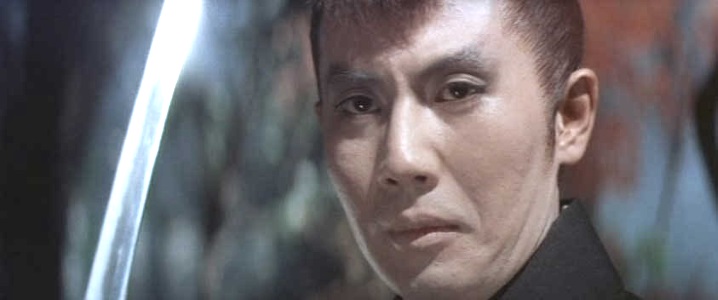
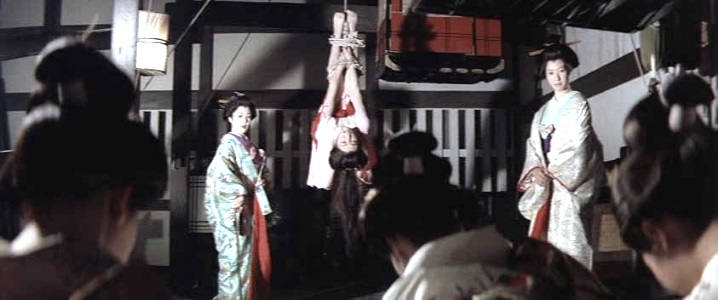
This film directed by Kazuo Ikehiro (who had directed two earlier Sleepy
Eyes of Death films) is beautifully shot. Vibrant colors, perfect framing,
a camera that captures the emotions wonderfully well with close-ups and distance
shots and a few near delirium scenes. Very stylish and a pleasure to watch.
But he crams in too many plots into a short time frame and leaves some of
them unfinished. One might speculate that this was due to Ichikawa's failing
health. Apparently, they had to use doubles for simple scenes because he
was so tired. There was also a scene when a number of ninjas come for him
and it just goes away without a resolution. Still, he is as commanding a
figure as ever.
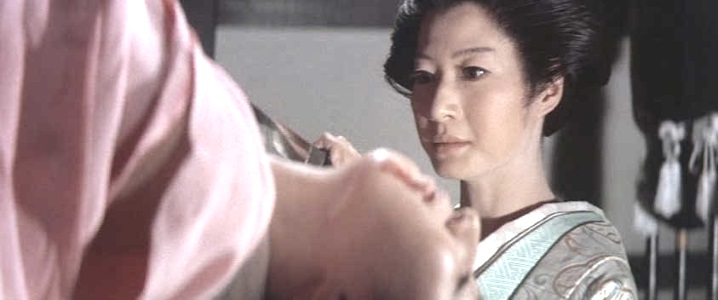
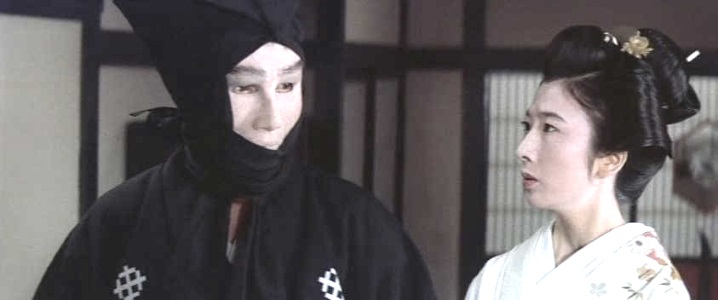
Someone is impersonating Nemuri - even wearing a mask of him - and killing
and raping people - leaving a note behind taking credit. Nemuri learns about
this while having an afternoon dalliance with a prostitute and for once not
being set up for a kill by her. His reaction is, ok - let him be Nemuri if
he wants to be. It is connected though to intrigue taking place at Edo castle,
the home of the Shogun. In the female quarters, trouble is brewing in the
O'oku - the harem - because two women have become pregnant with the Shogun's
baby. If it is a boy, he will become the heir apparent. The cunning and cruel
Nishikikoji (played by Naoko Kubo, an actress you will come across often
in these Daiei Samurai films) wants the pregnant woman's son under her control
to become Shogun, but the other baby will be born first. Part of her plan
to stop this is the imposter to get Nemuri into trouble.
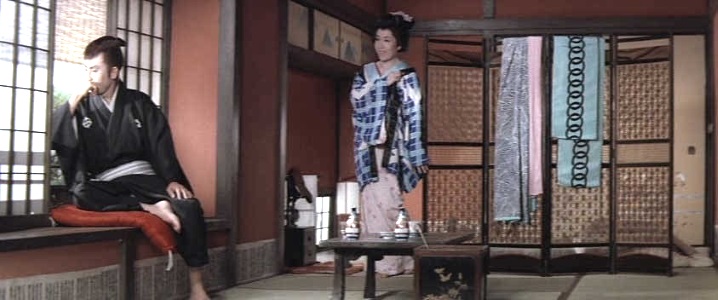
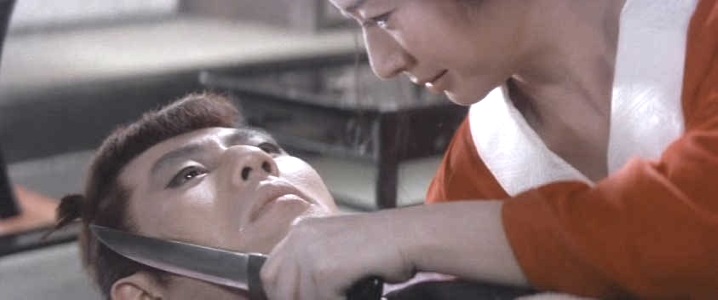
He is doing her bidding because he is a Christian and has been promised by
her that a group of 58 of them they can leave the country if he helps (being
a Christian was a death sentence). Throw in an abortion clinic, the Iga ninjas,
the sister (Shiho Fujimura) of the imposter and various attempts on Nemuri's
life and you have a filled to the gills film. One scene in particular stands
out. As Nemuri sleeps, outside of his room in the courtyard a dozen humans
in bird costumes float down as if in a dream. They get Nemuri up and lead
him to a ritual in which everyone is wearing a mask and told that the mask
on one woman has no soul and that she is a virgin and he must sleep with
her to give it soul. Of course, it is a trap and out of the darkness he is
attacked by ninjas. There were two more films in the series played by a different
actor. Not sure if I will watch those.
